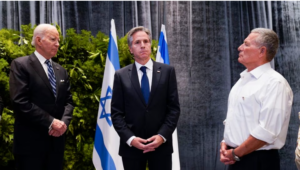
Blinken Austin tell US is ready to respond if US personnel become targets of Israel Hamas war Secretary of State Antony Blinken and Defense Secretary Lloyd Austin stated on Sunday that the United States anticipates the Israel-Hamas conflict to intensify due to involvement from Iran’s proxies. They affirmed that the Biden administration is prepared to respond if American personnel or armed forces are targeted in such hostilities.
Blinken emphasized their desire to avoid escalation, stating, We don’t want to see our forces or our personnel come under fire. But if that happens, we’re ready for it. Austin echoed this sentiment, asserting the U.S. right to self-defense and readiness to take appropriate action against any significant attacks on American troops and personnel in the region.
As high-ranking U.S. officials issued a warning, Israel’s military response to the October 7 attack by Hamas on civilians in southern Israel entered its third week. Israeli warplanes conducted overnight strikes in Gaza and Syria, targeting two airports and a mosque in the occupied West Bank that was allegedly used by militants. The conflict has also led to increased tensions, including near-daily exchanges of fire with Lebanon’s Hezbollah militant group and clashes with militants in refugee camps in the Israeli-occupied West Bank. In response to the escalating situation, the U.S. announced on Sunday that non-essential staff at its embassy in Iraq should evacuate the country.
Blinken, who recently spent several days in the region, expressed concerns about a potential escalation in the conflict between Israel and Hamas, which governs Gaza. He also highlighted the threat of escalation from Iranian proxies targeting U.S. forces and personnel. Blinken stated that additional military assets, including two aircraft carrier battle groups, were deployed to the region not to provoke but to deter any hostile actions and make it clear that the U.S. is prepared to defend its interests. Iran is considered an adversary of Israel.
President Joe Biden has consistently issued a stern one-word message to caution Israel’s adversaries from exploiting the current situation: “Don’t.”
Concurrently, a procession of trucks, laden with essential provisions such as food and water that are urgently required by the Palestinians in Gaza, persisted in their movement into the enclave on Sunday. This became possible after a crucial border crossing with Egypt was opened a day earlier, facilitating the commencement of humanitarian aid delivery.
Nevertheless, Cindy McCain, who serves as the Executive Director of the U.N. World Food Program, has emphasized that the situation in Gaza remains dire and “catastrophic.” She has underscored the need for even more aid to be permitted to reach the region. She further articulated that her organization was able to provide dinner for 200,000 people on Saturday, but she recognizes that this is just a small fraction of the assistance required. What is truly necessary is secure and sustainable access to the region, ensuring that people can be adequately fed.
Before the recent conflict, Gaza was receiving around 400 aid trucks daily, according to the statement. The situation was described as a catastrophe, and there was a pressing need to ensure the delivery of these trucks.
President Biden, while at his home on the Delaware coast, received briefings from his national security team regarding the latest developments. He also had discussions with Israeli Prime Minister Benjamin Netanyahu and Pope Francis. In the conversation with Netanyahu, they emphasized the importance of preventing further escalation in the region and working toward a lasting peace in the Middle East. It was noted that Israel had expressed its intention to carry out a military ground invasion of Gaza with the goal of countering Hamas.
Biden initiated a conference call with the heads of state from Canada, France, Germany, Italy, and the United Kingdom to address the ongoing conflict. During the conversation, the White House announced that the leaders pledged to collaborate closely to prevent the escalation of the war and actively pursue a diplomatic resolution.
In response to the increased tensions, the State Department issued an order on Sunday instructing non-essential U.S. diplomats and their families stationed at both the U.S. Embassy in Iraq and the U.S. consulate in Irbil to evacuate the country. An updated advisory to U.S. citizens in Iraq cited the deteriorating security situation as a hindrance to the normal operations of the diplomatic missions.

